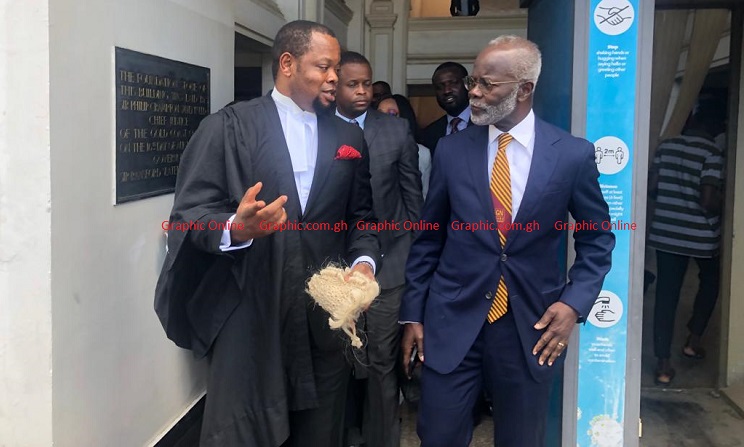
High Court can interrogate BoG revocation of licences – Supreme Court rules
The Supreme Court has declared that the High Court can interrogate the revocation of licences of banks and specialised deposit-taking institutions (SDI) by the Bank of Ghana (BoG) especially with regard to alleged breaches of fundamental human rights.
The court held that Section 141 of the Banks and SDI Act, 2016 (Act 930) which stipulates arbitration as the means of seeking redress for persons aggrieved by the BoG’s revocation of their licences does not oust the jurisdiction of the High Court to also determine the propriety of the revocation.
A five-member panel of the apex court unanimously made the decision on Wednesday [July 19] when it reversed a ruling by the Court of Appeal which had maintained that an arbitration tribunal and not the High Court was the proper forum for seeking redress against a revocation of a licence by the BoG.

Successful appeal
Advertisement
The highest court of the land gave the decision after it upheld an appeal by Dr Papa Kwesi Nduom, the Founder of the defunct GN Savings and Loans, who is challenging the revocation of GN’s licence by the BoG in 2019.
Dr Nduom and two entities connected to him dragged the BoG to the High Court with a human rights application arguing that the revocation of the licence was unfair, unreasonable and therefore against their rights to administrative justice as enshrined under Article 23 of the 1992 Constitution.
The BoG raised a preliminary legal objection challenging the jurisdiction of the High Court on the basis that per Section 141 of Act 930, the proper forum for seeking redress against a revocation of a licence by the central bank was arbitration tribunal and not the High Court.
The High Court dismissed the objection, prompting the BoG to file an appeal at the Court of Appeal.
On June 2, 2022, a three-member panel of the Court of Appeal, unanimously upheld the appeal by the BoG and held that the High Court had no jurisdiction to entertain the action on the basis that Section 141 of Act 930 had categorically provided arbitration as the means of seeking redress.
The court therefore halted the suit at the High Court and referred the dispute to the Ghana Arbitration Centre.
Dissatisfied, Dr Nduom appealed the Court of Appeal’s decision at the Supreme Court which was successful.
“A statute may create only one exclusive forum for redress when there is an express ouster of jurisdiction of other forums but this is not the case with Act 930.”
Supreme Court’s decision
Delivering the unanimous decision of the Supreme Court, Justice Gabriel Pwamang stated that although Section 141 of Act 930 mentioned arbitration as the means of seeking redress against the revocation of a licence by the BoG, there was no explicit provision barring the courts from also delving into the same issue.
“A statute may create only one exclusive forum for redress when there is an express ouster of jurisdiction of other forums but this is not the case with Act 930,” Justice Pwamang held.
Justice Pwamang held that even if Act 930 ousted a court’s jurisdiction in cases related to revocation of licence by the BoG, it would be unconstitutional for Act 930 to prevent the High Court from hearing an alleged human right violation in relation to the revocation of licence.
The High Court, he said, per Article 141 of the 1992 Constitution, had the jurisdiction to enforce the fundamental human rights of people.
In this regard, he said it was within the rights of people who felt aggrieved over the alleged violation of their human rights to petition the High Court for the enforcement of their human rights as stipulated by Article 33 of the Constitution.
The apex court dismissed an argument by the BoG which was upheld by the Court of Appeal that the application by Dr Nduom was purely a challenge against the revocation of the licence which was deliberately couched as a human rights application.
The Supreme Court held that whether or not the application was a human rights application was for the High Court to decide and therefore it was premature for such a determination to be made at this point.

Alternative ways
It was also the considered view of the apex court that the law sometimes gives litigants alternative ways of seeking redress and when such a situation arises, it was within the right of litigants to make a choice.
For instance, the court said a person aggrieved by a decision of the High Court can either file an appeal at the Court of Appeal or invoke the supervisory jurisdiction of the Supreme Court for judicial review or even file both for redress.
“The appellants have alternative means of redress which are all lawful and they chose redress under Article 33 of the 1992 Constitution for the enforcement of their fundamental human rights,” Justice Pwamang held.
Consequently, the court held that Dr Nduom had the right to file the human rights application, while the High Court was also right to have dismissed the objection challenging its jurisdiction to entertain the action.
“The Court of Appeal erred by preventing the High Court from enquiring into the complaints of the appellants,” Justice Pwamang stated.
Other members of the five member panel were Justices Mariama Owusu, Issifu OmoroTanko Amadu, Barbara Ackah Yensu and George Kingsley Koomson
Writer’s email: emma.hawkson@graphic.com.gh
